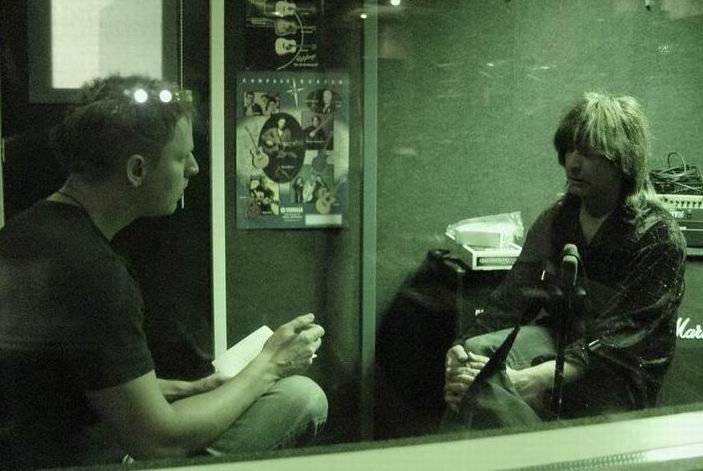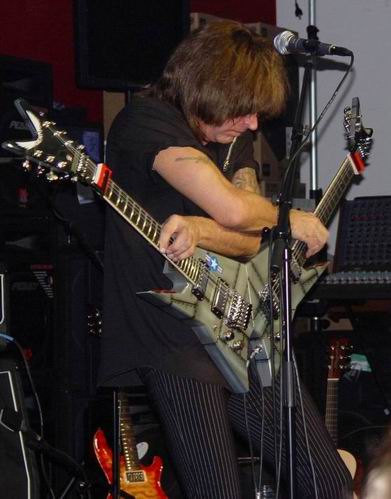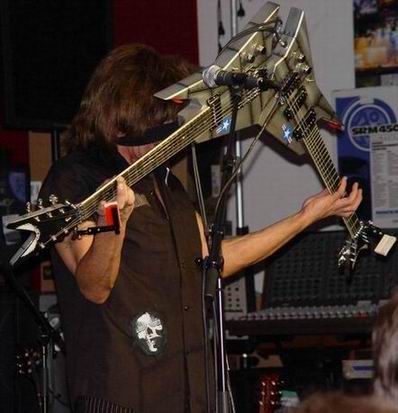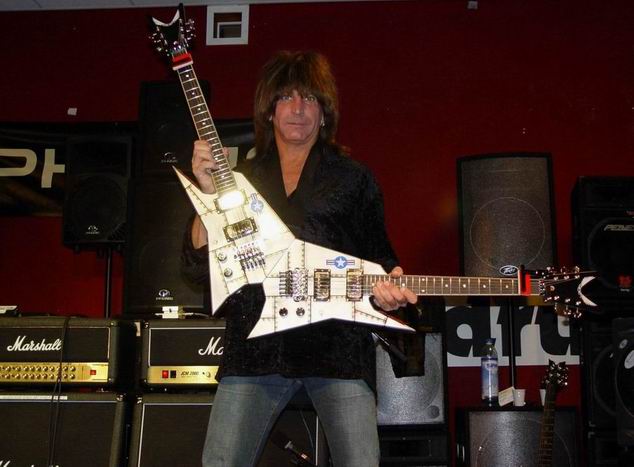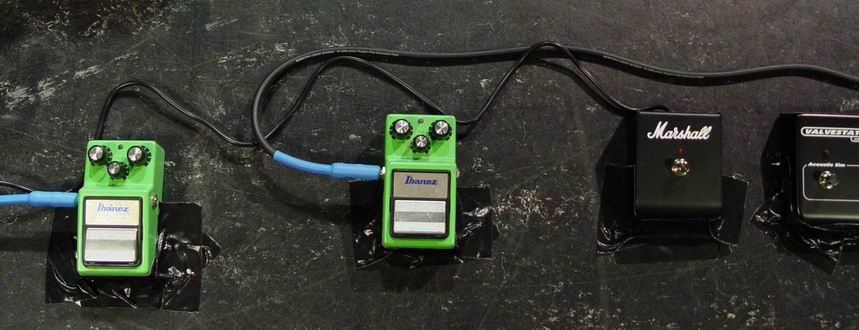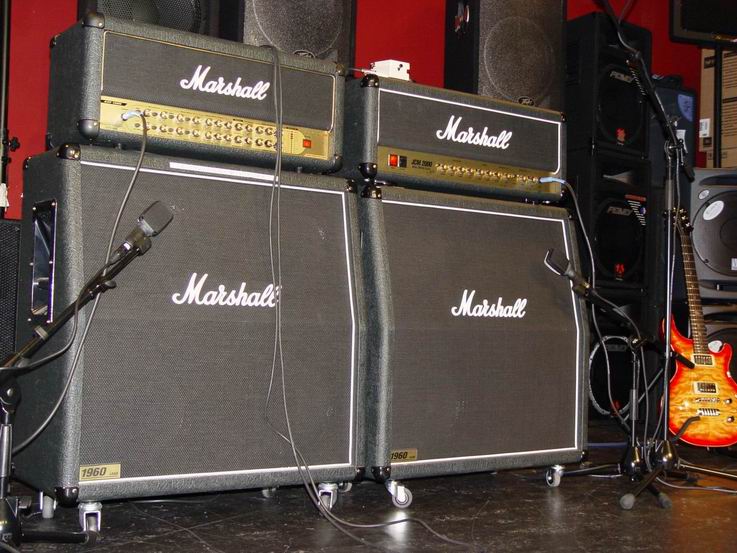Some people might be surprised that behind the ‘shredding’ and double neck image, there’s a serious musician hiding behing Michael Angelo – who mentions George Benson as his favorite guitar player. A conversation with a friendly Michael Angelo who put on a great and entertaining show at Feedback music, wed nov. 5th 2003, Rotterdam after our conversation. This interview was printed in the Music Maker december 2003 issue.
Photo’s by Richard Hallebeek
:: Copyright Music Maker ::
:: This is part of a tour for Dean guitars?
Yes, I’m close to one hundred shows already. I started out in january of this year.
:: Where have you been so far?
Ehm… I’ve been all over the united states, I’ve been to Canada and Mexico twice and this is my second time to Europe and first time to the Netherlands this year.
:: What do you bring with you on the tour, just the double-neck?
Yes, and this is the first show of the brand new one.
:: What about amps? You just give your preferences to the stores?
Yeah, what I do is I have backline requirements. So each place I play gets an equipment rider. And basically I use Marshalls.
:: What’s the amp you’re using?
I like the 2000’s, I use 900’s and I use the new 2000’s, they’re the solid state ones, too. Which is what I’m playing tonight. They’re great.
:: You’re playing in pretty big places. What about miking the amps?
Microphones… unless it’s something I really disagree with… tonight they’re Sennheiser’s. They’re fine. As long as it’s a good quality mike. A lot of my sound is in my fingers and the amp… and the guitar of course. Fingers, great guitar, the amp is almost secondary. As long as it gets a good sound I can play.
:: Your albums with Holland and Nitro are hard to find.
Yeah, what we do is.. I started a music company in 1993. So all my cd’s are available through my company. And it’s called MACE music. It stands for Michael Angelo Creative Enterprise. And my website is Angelo.com. That’s were you can get everything. We have certain distribution. Somtimes.. what country’s in Europe… I think it’s in Spain and Portugal. And then we had distribution in england and we had distribution all over the United States, Canada and Mexico.
:: How did you start out playing guitar? You had some jazz history?
I started out at ten years old and so I can’t really say I was in it for women (laughs) ’cause I was too little. But I loved rock music and I studied jazz in school and then I went out to get a degree in music at the universatiy in Chicago. I’ve been a professional musician since I was 18 years old. I have a degree in music theory and composition. And..then what happened was..when I studied music, Beethoven looked wild. Paganini had great stage presence. Mozart played with his hands criss-cross behind his back when he was a little boy. These guys are on MTV. So I thought, I’m a great guitarist, I wanted to have a live show that would equal Jimi Hendrix and Mozart and Paganini and Led Zeppelin’s, so that where I came up with the ‘under-over’ and my double guitar.
:: What started first?
The ‘under-over’, it started at about 15. Really it started of as..from sheer boredom. When you’re playing songs with a lead singer and 90% of the song is vocals, you’re like..ok I get 5 seconds to do a solo, here we go!
:: When did the double-neck thing started out?
I started… I had the idea when I was a child. I used to draw the diagrams. But it wasn’t until I was in my early twenties that I was able to get somebody to actually build it.
:: You did not have any examples at the time, right? There was Steve Vai with the heart shaped triple neck guitar..
Well, Steve Vai took it from me. And gave me the credit. He was very nice. He even said the he took it from Michael Angelo. So that was nice. But I was really the very first one. And the first company that made the guitar was Dean guitars. I bought Dean guitars. They were a really popular guitar company in the United States and I just love their guitars and I’m really happy to be with them now. I left when Dean himself sold the company. Then I went to Washburn for a while. But I like Dean so much better. Dean came back and so now it’s Elliot and Dean and that’s the same people I worked with before.
:: When you started out playing the two neck guitar, there were no examples for you and you had to make up your own stuff? What did you study, classical stuff?
What I studied at first is double lead. And in unison. And because I’m left-handed.. I play guitar right handed but that’s only because there were no left handed guitars when I was little. My natural way to write is lefty, this was also a natural way for me to play. And I play piano, so..But I didn’t start out with classical music, I started out with rock. And when you see my doubleguitar solo tonight, I really mix it up.
:: Any favorite players besides the stuff you already mentioned like Led Zeppelin?
I have favorite composers. In guitar players, I like all the classic people like Hendrix and Jimmy Page.. I like people like George Benson…there’s a guitar player from here, Jan Akkerman that I used to listen to all the time. As far as music..I listen from everything from Bach to Beethoven to Evinescence.(laughs) I think my favorite all time players are probably George Benson, Frank Zappa, Robbert Fripp and let me think…and then I would say Django Reinhardt, too.
:: Pretty wild combination there.
Yeah, and I think it’s nice to see so many young people listening to guitar again too. I think music, like anything..Bach is as good today as it was 200 years ago. Even Led Zeppelin, I walk into music stores, I play shows in universaty’s in the United States..there’s 18 year old kids, they’re not listening to Evanescence, they’re listening to Led Zeppelin.
:: Do you feel it’s hard to be taken seriously by the “serious” music scene, despite all your history and profound knowledge of the instrument?
I think so. But I think that they can’t deny one thing. I’ve been accused of being too fast..I’d tell them they can’t hear fast enough. Because the people know, that are my fans, that, A: I can play superfast. B: It’s really clean. C: there’s melody, D: there’s feeling. So the double guitar.. that would be like saying, well Jimmy Page isn’t good because he used a violin bow. Or: Frank Zappa sucked because he put like those dolls on stage. What real musicians sometimes don’t want to acknowledge is that I’m known all over the world for this. And if someone doesn’t have their thing to get known they don’t like that I can do it. And.. I don’t begrudge other musicians. But I find that I’m still here. I’m still playing more then ever so I’m doing something right. I’m so busy.. this year it’ll over a hundred and then I just finished an instructional DVD and two cd’s. So that’s a lot. And I just love doing it. Especially coming here. And I got to look around Amsterdam! I’ve been here six or seven times and never walked around the city. We went everywhere from the red light district..and I don’t do drugs but I walked around and just.. looked on the menu (laughs) What a great city, no city is like it.
:: An interesting tool to see was the string damper you’re using. Your invention, right?
Yeah, and you know where I got the idea? In fact it was a guitarist from your country, George van Eps. He’s another great guitarist. He came up with a kind of dampener, because he wanted to… I’m not really sure exactly why he did it, but I know he did do one similar to mine. But I really need those to be able to play. And see, that’s were..here’s how I look at the double guitar. For serious musicians.. I don’t use that in the studio. There’s no need for that. But.. live I really play it. And the stringdampeners allow me to just play both necks. And that’s my third hand, that mutes the strings. And I’ve sold them to some big guitar players. Joe Satriani, Jennifer Batten, a lot of country players, a lot of Swedish death metal bands. Because in the studio they help clean up your lead guitar. We sell ’em all over the wordl. And the great thing is: you don’t have to drill into your guitar. You just put it on and it’s two thumbscrews. And then you take it off and you’re done.
:: What kind of material is it, the same dampener stuff that’s inside a piano?
Yeah, that was my idea, I thought, what is the longest, largest string on the planet? A grand piano. Or a harp, but harps don’t use dampeners. So I looked inside the piano, I studied the construction of piano in school and I went to a company in my hometown of chicago that sells piano dampening stuff. So that’s what I use.
:: I know a lot of players who are actually looking for that dampening device to clean up their legato playing. I will forward them to your site.
You see, my website is really popular. We get, and this is no exegeration, 70.000 different people a month. Check out my website. That translates to a million hits a month. So it’s a popular site.
:: What will you be performing tonight, stuff from your new DVD and album?
Yeah, from my new DVD called ‘Speed Lives’. I had one called ‘Speed Kills’, it was through Metal Method, the big company in the United States. It did really well. In Guitar World they voted in the top 50 ‘must have’ guitar DVD’s. We did a follow up called ‘Speed Lives’ because..there’s many people that say I play fast, they just want to think that I play fast. They don’t hear that I’m really slow and tasteful, I’ve got a great guitar sound.. some people don’t want to acknowledge that..but that’s up to them.
:: What are your pickups?
I use all Duncan’s. The hardtails have the JB pickup in the bridge position and the Pearly Gates in the front. And different guitars, different version of Seymour Duncan’s. High output is the secret.
:: You like to keep the gain on your amp low?
I keep it low, very low.
:: You use tube screamers?
Tube screamers are EQ. If you look at the settings of my amp, the gain is down, but the tubescreamer adds the gain and overdrive. I hate too much distortion, it comes out too fuzzy.
:: Another side of you is that you do quite a lot of session work, TV commercials, studio work?
Yeah, I haven’t done much this year, I just can’t, I’m so busy.
:: How did you get into that scene?
Because I don’t have to play fast and I can read music really good and I was able to do the one thing that a session guitar player needs to do:I can come up with creative things. That’s really what a great session guitarist does. I started out in Chicago, my hometown and I was a big session guitarist there, when I got to L.A. my double guitar got me known but then people who are in the industry know that I’m a really great guitarist. So they knew that they could call on me to do the parts. I was lucky I guess. But I work very very hard at it.
:: How’s the music scene in L.A. nowadays?
I think the music scene is… not so great. I find I play less and less in L.A. But, the music scene on a world-wide scale is really good I think. Because, for example, here ten years ago I don’t think people in Europe heard the same music as in the United States. Why? Communication and the internet. MTV was big but, there was MTV Europe and MTV in the U.S. Now I go to my hotel and see what music is out there and it’s the same as the United States.
:: It’s more a global thing nowadays.
And the internet has changed everything. I can speak to you just as easily through the internet as I can speak to somebody down the street. The internet is huge. I’ve been online since 1996. We sold my cd’s everywhere from Saoudi Arabia to Egypt, to Europe, to Australia, to New Sealand, Indonesia, Russia, it’s all over. I like big city’s. Like Amsterdam. Everyone in the world know about Amsterdam, it’s probably one of the top 10 city’s in the world. When I come to places like Amsterdam, it’s very much like L.A. In where that it’s extreme. People that experience city’s like that, I think usually it puts an edge to their music. That’s my feeling. In Amsterdam you can look really weird and nobody cares. Like in L.A. But you move to Cleveland, Ohio and people go: UHUH! So you start to change your behaviour to fit in with the people.
:: There’s more room for individuality in big city’s.
And musically and creatively too.That’s what I like. I think we’re in a new era of guitar playing. I call bad guitar playing 90’s guitar with no leads. It was purpously bad. And in America, some magazines glorified that and said that’s really good.
:: That’s around the time I stopped buying guitar mags, yeah..
Who wants to read about Limp Bizkit on the cover of guitar world, you know? I mean, I like guitar world but I don’t care about a contact lens. I want somebody who can play.My fan base, most people who listen to me now, are under 21. Because they don’t know how the heck I do what I do. And kids wanna know that. They don’t know about guitar leads. It’s interesting, we’re in a real good spot in guitar music right now. And I don’t want the 80’s to come back. Nobody’s asking for Judas Priest or Scorpions.I don’t think we will remember many guitar players from the 90s’. But we remember ’em from the 80’s, 70’s, 60’s, 50’s, 40’s, 30’s. And we’re also gonna remember guitar players that are still here now. That’s my feeling.
